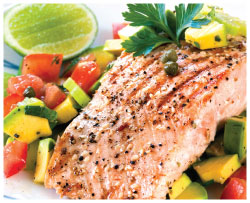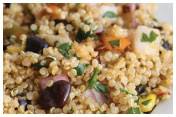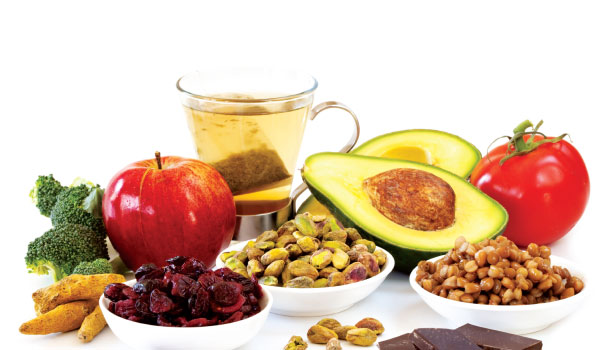Another day, another diet? Not exactly. A new food movement has emerged called clean eating, which is a lifestyle concept that has people running from genetically modified foods, over-processed ingredients, pesticide-laden produce and returning to good wholesome meals.
Don’t confuse clean eating with other buzzwords in the nutrition world at the moment such as the paleo, raw food or the caveman diet as they may complement clean eating, but are what they say they are — diets! Highlighted by food in its purest form, meaning nothing processed or refined, clean eating is a sensible, healthy and conscientious approach to eating. Think home cooked meals with the freshest ingredients possible. As our experts reveal, with a little meal planning, anyone can serve up quick wholesome meals and have the peace of mind of knowing exactly what goes into your food.
Living the clean eating way
Our expert: Line Jin, CrossFit Level 1 trainer
Bahrain resident Line Jin, fitness trainer and busy mother of three, is perhaps the ideal model of putting theory into action when it comes to clean eating. Line suffered for years from migraines, which were exacerbated during her last pregnancy where she was also hit with the shingles and psoriasis. Fed up with high doses of medication and a plethora of ointments, she felt it was time to take charge of her health.
 “I decided to do everything within my power to come off all drugs. In fact, I threw everything I had in the bin and from that day on it was all down to eating better,” reveals Line.
“I decided to do everything within my power to come off all drugs. In fact, I threw everything I had in the bin and from that day on it was all down to eating better,” reveals Line.
She cut out dairy, wheat and ‘white stuff’ such as sugar, pasta and rice. She found replacements in homemade nut milks, pestos, flax crackers, quinoa and many more healthy food options.
“In my opinion, clean eating is about eating whole foods in its purest form. This means one-ingredient foods: nothing processed, nothing man-made and nothing that comes out of a package that has a long list of nutrition facts with things you didn’t even know existed,” she explains.
After making these dietary changes, Line recovered from the migraines and the psoriasis cleared up. “I felt healthy, strong and alive,” she admits.
Making such sweeping changes to the food she and her family ate was a challenge at first because she had to learn what foods to eat and how to prepare them as meals.
“I tried to imitate and replace all the flavours and all the processed food that was once part of my poor eating habits. I’ve since learned to enjoy and appreciate the pure flavours of just one food at a time. Dishes don’t have to be mixed with anything or smothered in dressings to taste good,” says Line, whose typical meal is grilled chicken breast seasoned with cumin, raw broccoli and raw walnuts, which she says is easy to prepare, super healthy and provides the right balance of carbs, fat and protein.
Adapting clean eating into a family lifestyle like everything else requires some planning.
“It’s a challenge to eat clean in the sense that everything needs to be available,” says Line, who does her shopping at the fish market in the Central Market area, local farms and a variety of supermarkets. By prepping and portioning meals on the weekends, she can feed her family wholesome home-cooked meals for several days at time.
“My kids eat the same but eat more carbs in forms of fruit, oats and brown rice. We keep a dairy-free home, but the kids are not restricted when out for birthday parties for example. They enjoy pizza and ice cream like other kids,” says Line who makes her own version of ice cream using frozen bananas with a toffee caramel topping made of frozen dates, grated dark chocolate and chopped walnuts to complement the sweetness.
Cooking is easy
Our expert: Roaya Saleh, managing director, Villa Mamas
Restaurateur Roaya Saleh is passionate about clean eating in both her family kitchen and at her Saar restaurant.
“Cooking is easy,” exclaims Roaya, adding that even the most complicated dishes can be made within an hour. “It’s clean eating when you know what goes in your food.”
 The main idea behind clean eating is getting in the kitchen and really enjoying the simplicity of food. Both Line and Roaya dismiss the idea that we need to slave over a hot stove for hours on end, but being in the kitchen does require an understanding of the basics of food ingredients and tools that we should use.
The main idea behind clean eating is getting in the kitchen and really enjoying the simplicity of food. Both Line and Roaya dismiss the idea that we need to slave over a hot stove for hours on end, but being in the kitchen does require an understanding of the basics of food ingredients and tools that we should use.
For example, if you want to make a quiche but don’t have the proper pan to make it in, then you will never make that quiche.
“At the same time,” Roaya says, “we also worry too much about following recipes. Aside from baking, where we have to really follow recipes to the letter, we can and should be less rigid about measurements and ingredients in cooking. People know what they like to eat but are intimated in the kitchen. I love nuts, fruits and dried fruits. So I try to incorporate them in the dish even if the recipe doesn’t call for it because I know what I like to eat.”
People need to take time, educate themselves and be in charge of their own kitchens explains Roaya who plans and prepares her family meals on weekends and before she leaves for work.
“Lots of women don’t know the difference between herbs, oils or grains. I’ve had ladies ask me about quinoa, which I also didn’t know about until I researched it online,” she admits.
Quinoa is a protein-rich seed that has garnered global attention as the new superfood due to its nutritional value and its ability to act like a wholegrain such as rice.
“If you don’t know basic ingredients, then you feel afraid and say I am not going to touch it,” she says.
Say no to processed foods
Why would we need processed foods when all the ingredients for good wholesome foods are all around us? How can you not see them?
“You see the farmers on the street selling their produce. They have the basic ingredients for a good pasta sauce such as tomatoes and herbs such as parsley, coriander and arugula to make pesto. It’s easy to make and you can jar it and put in the fridge for more meals,” encourages Roaya.
Bahrain’s soil is fertile, producing a variety of seasonal vegetables including okra, aubergine, carrots, cucumbers, herbs and a variety of lettuces. Roaya also advises a visit to the fish market for good local and inexpensive fish that can be cut and filleted by the fish monger. The key is to plan your meals for the week and you will be less tempted to eat out or order in.
What is clean eating?
Our expert: Clean Eating, cleaneating.com
Clean eating, according to the American magazine Clean Eating, is defined as consuming food in its most natural state or as close to it as possible. Clean eating is not a diet but it is a lifestyle approach to food and how it is prepared.
Nutritionists agree that clean eating is a sensible approach to a healthy lifestyle. Purported benefits included a trimmer you, brighter skin, higher energy levels and an increase in general health.
The first steps
Buy local and organic. Take control of the foods you buy and source local fresh produce and as much as its available, organic meats, eggs and dairy. While buying organic meat and dairy on the island can be a challenge, finding local fresh produce is a breeze with roadside stalls and weekend markets teeming with seasonal greens.
Avoid processed or refined foods. Instead of white breads, flour, pasta and rice, choose the whole grain alternatives.
Watch fats. Avoid anything high in saturated and trans fats and consume ‘heart smart’ fats such as essential fatty acids found in fish, some seeds and dark leafy greens.
Eat plenty of fresh fruits and vegetables. Use seasonal produce and if cooking, steam, bake or lightly sauté to maintain as many nutrients as possible.
Eat meals and snacks. Eating three meals a day plus having two to three healthy snacks throughout the day is the most efficient way to stay energised and burn calories.
Drink water. Drink at least two litres of water daily and limit your alcohol intake to preferably one glass of antioxidant-rich red wine a day.
Read the labels. The longer the list, the less clean the food will be.
Call 17 305-031 or email villamamasbh@gmail.com
Clean eating in Ramadan
 There is no better time to consider clean eating than during the Holy Month, which provides a unique opportunity to change our poor dietary habits in exchange for healthy eating. Fasting involves both a spiritual and physical journey and the cleansing of the soul. Enjoying good wholesome food during non-fasting hours is vital to this journey.
There is no better time to consider clean eating than during the Holy Month, which provides a unique opportunity to change our poor dietary habits in exchange for healthy eating. Fasting involves both a spiritual and physical journey and the cleansing of the soul. Enjoying good wholesome food during non-fasting hours is vital to this journey.
While clean eating is a ‘back to basics’ approach to a healthy lifestyle, many people are not interested in the basics and go straight to attempting complicated dishes. This is why Roaya offers
‘back to basic’ courses at night throughout Ramadan.
The three-day course will cover topics like home-grown and locally abundant herbs and spices, rice and beyond, the perfect egg dishes, how to make your own stocks, pantry must-haves, recycling your daily leftovers, the dos and don’ts of frozen foods, and oil varieties and their benefits.





































